collegesgalore
30 posts
Don't wanna be here? Send us removal request.
Photo

Conquering the Why Major? Essay, by findx
If you’re applying to colleges, you’ll probably be asked to write about why you want to study a particular subject. Why do you want to major in biochemistry or psychology or anthropology? I’m here to help you write an engaging, persuasive essay that will help you get into the school of your dreams.
What if you don’t know what you want to study? That’s fine! Colleges know that your aspirations will likely change. Just write about what you currently want to major in. If you’re super, super undecided, pick a subject that’s related to your extracurriculars (for example, if you volunteer a lot at the hospital, maybe go for pre-med).
Let’s get right into the most common mistakes I see on Why Major? essays:
-Being generic. Saying, “I want to study political science/math/etc. to help impact the world” is really general. Okay, any major has the potential to contribute meaningfully to society. Why do you specifically want to learn this major? Saying something like “I want to study political science because I interned under a senator last summer and fell in love with the work” is a lot more powerful.
-Being too honest. Saying, “I want to go into pre-med because doctors make a lot of money” or “I’m going to study engineering because that’s what my parents want” is not going to help you, even if those are the real reasons why you’re interested in the subject! Emphasize your passion and genuine interests.
So how can you make your essay stand out?
-Talk about how you’ll apply your degree to a future career. I know a girl who got into Harvard, Stanford, MIT, Princeton, and UChicago by talking about how she wanted to study both music and neuroscience to learn about how music impacted mental health. Colleges want students who will use their knowledge to make the world a better place.
-Tie in your personal experiences. Talk about past extracurriculars, sure, but also discuss what motivates you. One of my former classmates wrote about how a sibling’s cancer spurred her to pursue pre-med. Show that you have a true emotional stake in the subject you want to spend the next four years studying.
-Get a little creative. Every year, universities get thousands of applicants who want to study computer science. Make yourself stand out by telling a funny anecdote, or using a unique metaphor.
Good luck! I’m still giving feedback on essays, so if you want me to look over your writing, please message me. If you want more information, check out my other posts:
Conquering the Why School? Essay
Quick and Easy Tips for the ACT (no prep required)
331 notes
·
View notes
Photo
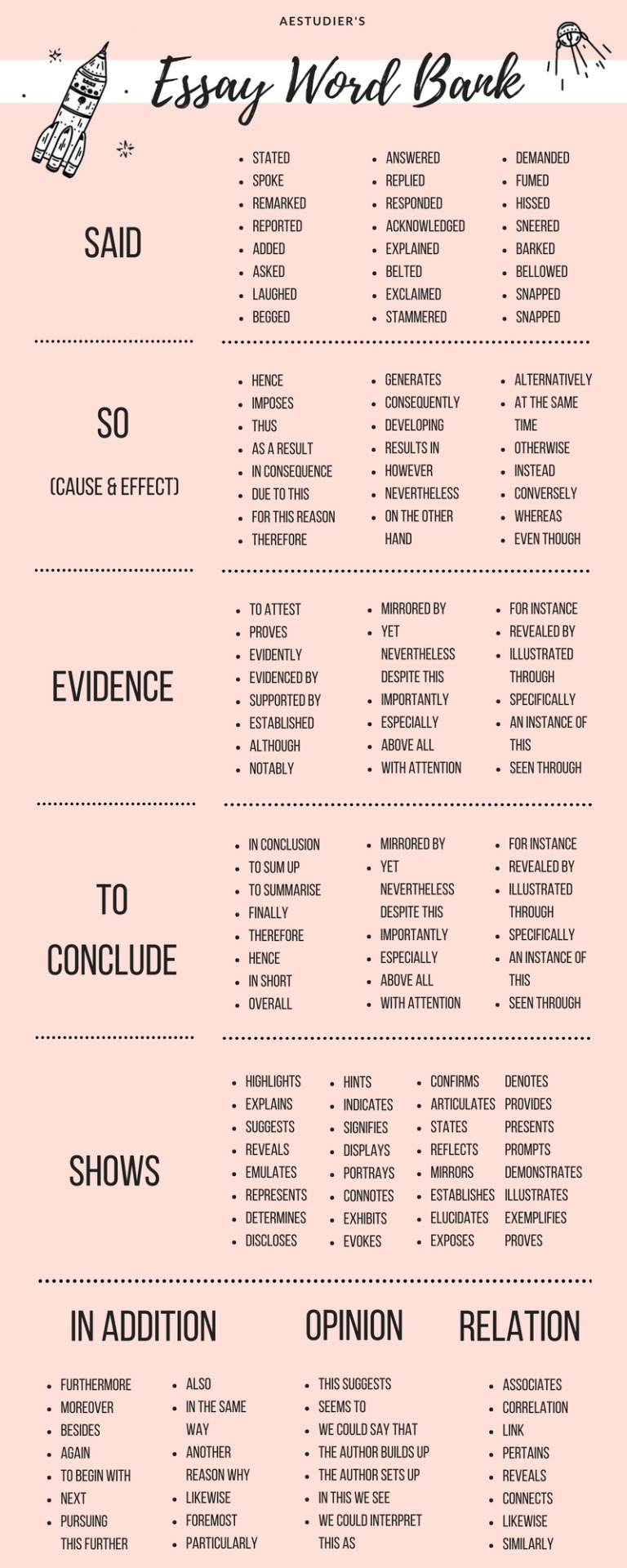
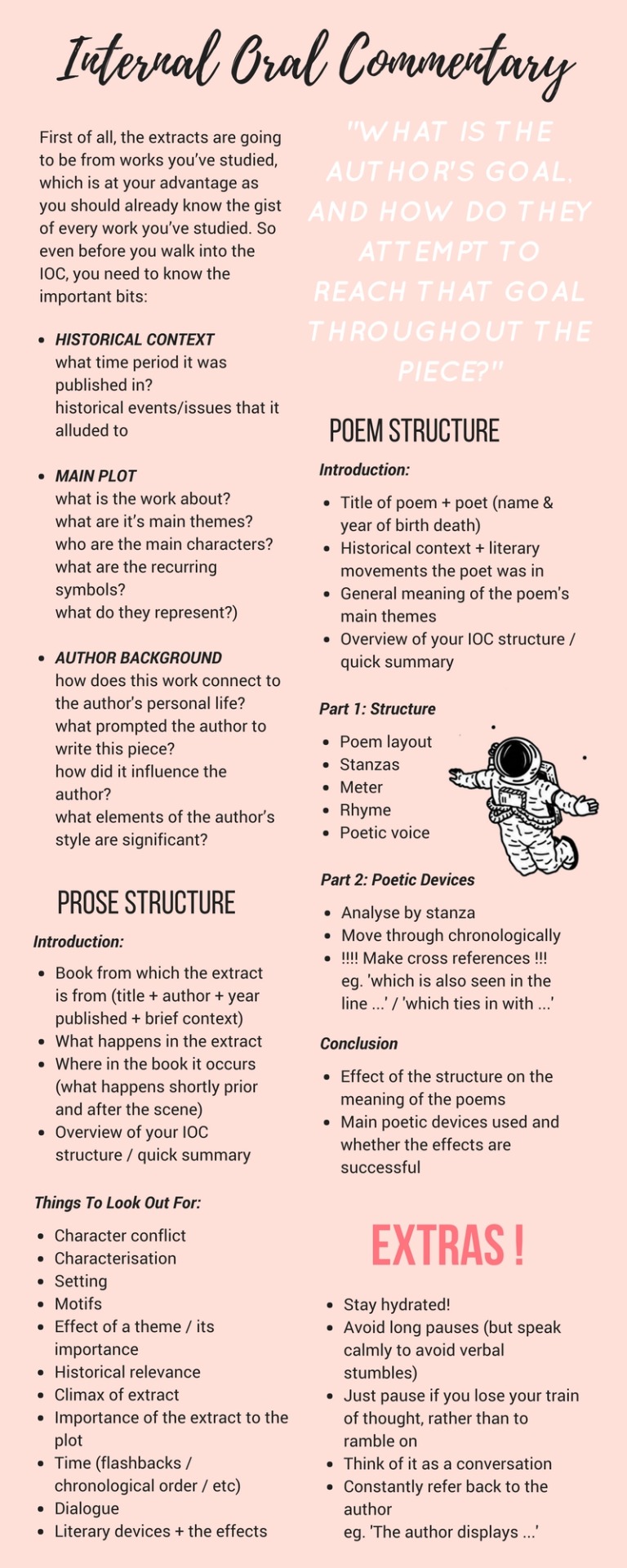
Just completed and submitted the final version of my Extended Essay !!! °˖✧◝(⁰▿⁰)◜✧˖°
So I compiled lists of words that I found super super useful in making it easier for me to finish any essay !! Here is a masterpost of some sort with transition words + key vocabs grouped together for easy access as well as an IB IOC ‘cheat sheet’ I used for my english LAL orals last year (though most commentaries follow a similar structure so its generalisable) ~
Good luck with your essays !!!
… oops just realised I forgot to bullet point one of the lists
41K notes
·
View notes
Photo

Conquering the Why School? Essay
From a student who got into MIT & the Ivy League
I’ve read many Why School? essays. These often come across as generic, with no real indication of interest. I’m here to make sure you don’t make the same mistakes in your essays.
-Look up their course catalog. Don’t simply write, “I’m interested in your stellar economics program.” Great, so are hundreds of other applicants. Name-drop a couple of classes and explain why those specific courses appeal to you. It’ll show you’ve done your homework.
-Discuss a few clubs. Colleges want students who will contribute to their campus outside of the classroom. Are you interested in journalism? Talk about joining the school newspaper. Are you a violin virtuoso? Indicate your interest in the orchestra. Or are you into something that isn’t yet available? Say you’ll start a new group!
-Latch onto research opportunities. Schools love students who can contribute to their published papers. Look up ongoing research projects in whatever department you’re interested in (and no, research isn’t only for STEM fields!) and talk about how you’ll get involved.
-Talk about what makes a school unique. Columbia has a Core Curriculum; Princeton has a yearlong bridge program in Bolivia. Why do you want to attend this specific school?
-Touch upon your long-term goals. How will this university help you achieve your goals of becoming a lawyer? How do you want to make the world a better place? Colleges are looking for people who will contribute meaningfully to society.
-Don’t mention rankings or prestige. Harvard already knows it’s world-renowned, it doesn’t need you to stroke its ego. You should be choosing the best school for you, not the best school according to US World & News Report.
Good luck! I’ll also be happy to read your college app essays, feel free to message me :)
2K notes
·
View notes
Note
Hey Rona! For the MIT interview, would you suggest that we contact our ECs before we finish our applications, or afterwards?
hey!
it depends–it’s more important to email your EC weeks before the application deadline because it takes a while to schedule interviews. but i definitely think you should have most of your application done–essays drafted, etc.–before your interview so you have a good idea about what you should talk about.
3 notes
·
View notes
Note
What do you believe set you apart in MIT admissions and what advice would you give for a rising junior who has their eyes on MIT as their top choice school? Thanks!
hey!
I wrote about this recently here. Since you’re a rising junior, my #1 advice would be to apply for STEM science camps for next summer–especially MITES/WTP/RSI (although the last one is REALLY tough). There’s also SSP, Simon’s, PROMYS, Ross, etc. One of my roommates got to see her MIT application and the admissions officers’ feedback on it, and the fact that she did SSP was the biggest plus on her app–more so than her getting into ISEF or qualifying for AIME five years in a row or any of the other amazing things she did. Good luck!
16 notes
·
View notes
Note
do you have any quick tips for making your essay really stand out?
Write using some combination of:
powerful imagery
a new take on an old idea
an uncommon perspective
a non-standard format
well-metered writing
a persistent narrative timeline
subtle motifs
brutal honesty and vulnerability
a magnificent depiction of a common entity
a denial of expectation
a clear authorial voice (MUST HAVE)
well-placed sarcasm
You can write a powerful essay about pretty much anything using ^^^^^^^this shit right here^^^^^^^
1K notes
·
View notes
Note
hey Julia! i was wondering if you had any advice. i dont want my essay to convey a predictable theme. like, of course going through a hardship makes you resilient. how do you dig deeper to find unconventional ways an event shaped you? and do you have any examples
Some of my first thoughts are:
Talk about an incidental way in which a significant hardship shaped you. Learned or perfected something small and otherwise insignificant as a result of a shitty situation? Focus on that instead of the ~big resilience narrative~. For example, say some really serious family shit went down that resulted in you being effectively homeless and bouncing between friends’ houses for a while in high school. You learned some big lessons, probably, and got to know yourself better, but you also learned how to cook bacon perfectly. Maybe one of those friends showed you how; maybe you sat in a diner every Saturday morning and watched someone cook through the tiny window in the door to the kitchen; it could be anything. Write about the bacon. Don’t try to make a lesson out of it.
Twist the narrative. Maybe you thought you were more resilient than you ended up being. Maybe you were thrown headfirst into the world of vulnerability and had no idea how to navigate it.
Write about the process of writing about a hardship. Meta shit, man. But it could work if you do it right.
Write a satirical essay about how an event or hardship made you a terrible person. Satire, when done well, can go pretty far. Just make sure you’re a strong writer before taking this on.
Write a letter to yourself from the perspective of a hardship you faced. For example:
“The other day I received a letter, covered in ash and smelling a bit like burnt toast. Dear Anon, it read, It’s been a while. But I’ve not been able to push our brief embrace from my mind, and I find myself aflame with jealousy as I watch you court these others, spending your nights with them despite what we had. Frankly, Anon, it’s not what I expected from you. Surely you’ve not forgotten me this easily? I took you by storm, you quenched my searing thirst, and now all I’ve got to remember you by is that bit of skin by your right elbow. I’ve held onto it. Is that strange?”
Write about your experience processing an event that didn’t feel like a big deal at the time but later came to impact you in some way. For example, I was struck by lightning as a kid and used the story as a fun party trick (two truths and a lie, was always a winner) but realized, years later, in an audition in which I was using the story as a monologue, that it had actually been haunting me in a big way.
If all else fails, avoid the event/hardship question. The resilience narrative is overdone to hell and back, so unless you’ve got some fresh take on it it’s probably best to steer clear.
380 notes
·
View notes
Photo
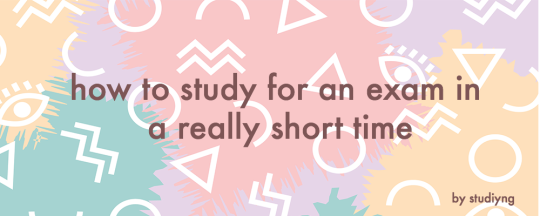
we’ve all been in this situation for different reasons, anxiety, procrastination, work, way too many assignments in a week. but fear not my friends, hopefully, this masterpost will help you get A’s and organize your study schedule.
also please only do this every time you need to study for a test, cramming is not good for learning and pulling all-nighters frequently isn’t healthy.
study tips
cramming
how to cram for a big test by @studyign how to cram efficiently by @study-studymore-studyhard test and cramming tips how to cram the night before a test and pass 10 ways to cram successfully
all-nighters (the last resort)
how to pull an all-nighter and pass your exam all-nighter survival tips by @rookiemag how to pull and effective all-nighter stay all night without feeling sleepy: pt1 / pt2 expert-approved guide to pulling an all-nighter pull the most efficient all-nighter how to pull an all-nighter how to pull and all-nighter : from the special forces do’s and don’ts of pulling an all-nighter
really do them if it’s absolutely necessary:
is it bad for you to pull and all-nighter why you should never pull and all-nighter
the night before the exam
study the night before by @renaissence study the day before by @getstudyblr night owl study tips by @lawjournalsandwine the night before the exam by @studyspoinspo how to study the night before a test the night before the exam tips top tips for the night before and the morning of the exam how to pass an exam if you forgot to study the night before study the day before the exam 10 things you should do the night before a test 7 mistakes you make on the night before an exam you’ll never make again
i have less than a week to study
five day study plan by @brandi-studies how to study for an upcoming exam by @noteblr how to remember everything for a test in 3 days by @getstudyblr when you have a test really soon study well in short time study for exams in limited time ace an exam that’s around the corner
tips
25 study tips by @studyign how to study more efficiently fastest way to memorize by @studyign common study mistakes by @studyign tips on study last minute by @milkystudies how to get things done by @lattenotlate study smart not hard 10 tips to study smart and save time useful tips to study in short time how to study for an exam effectively prepare for a exam in a really short time study for an approaching exam the secrets to study effectively in short time nice time management advice how to study in groups how to stay focused by @elkstudies finals week masterpost 22 science based tips to study for an exam 20 study hacks to imporve your memory
exam tips
tips for during the exam
15 tips to boost your exam performance
how to answer exam questions
7 last-minute exam tips
28 top tips for exams and tests
top 10 tips for taking exams
last minute revision tips
exam prep
how to mentally prepare for a test by @eruditicn
anti procrastination masterpost by @elkstudies
beat anxiety and stress in 1 hour and start studying!
how to stop procrastination
deal with exam anxiety by @attackonstudying
scientifically the best ways to prepare for an exam
motivation
how to get motivated
my motivation tag
more masterposts
app masterpost
DIY masterpost
food masterpost
how to: group work
printable masterpost
language masterpost
music masterpost
my study methods masterpost
36K notes
·
View notes
Note
Do you have any tips for actually applying to scholarships after you've found ones to apply to? Thanks in advance! xxxx
Scholarship Application Organizers: X, X
How to Fill Out Scholarship Applications
How to Apply for a Scholarship
Writing a Scholarship Essay
4 Ways to Make Your Scholarship Essay Stand Out
Top Ten Scholarship Tips
6 Scholarship Essay Errors
How to Write a Winning Scholarship Essay
5 Secrets to Winning a College Scholarship
Write a Scholarship-Worthy Essay
Scholarship Helpful Hints
Make Your Application Stand Out
356 notes
·
View notes
Note
Hi I just wanted to say that I'm going to have an interview for MIT this Wednesday and I'm suuuuuper nervous. Do you have any tips please?
Here’s my post on college interviews!
Some stuff I didn’t include the first time around:
Turn your phone on silent or airplane mode if you have to bring it at all
Use the bathroom beforehand
Remember that 70% of communication is nonverbal and largely reliant on status cues. To portray high status, sit up straight, take up space with your body (but not excessively please!), avoid deer-in-the-headlights face when asked a question, and avoid touching your face/fidgeting/playing with your hair or clothes. Visible hands are also a nice touch. This is a lot to remember, so just focus on being comfortable.
Don’t wear anything that you can’t comfortably sit in for half an hour
Remember that your interviewer is a person. This is surprisingly easy to forget.
Good luck!!
47 notes
·
View notes
Text
Would You Admit You? genericappblrurl’s College Essay Masterpost
Here it is: the college essay masterpost. Keep in mind that if you’ve written an essay that fits the description of any of the “don’t do this!” bits, it’s not a reflection on you as a person. The makings of a good college essay are, at times, entirely counterintuitive, so many of the errors in here seem completely justified.
The most important thing to consider when writing a college essay is the degree to which you pass the Turing Test. Basically, do you sound like a person? Even if you think the answer is yes, spoiler alert! There’s a decent chance it’s no. Why? Well, consider the fact that each admissions officer at any selective school reads hundreds, probably thousands of essays per year. Now, consider the fact that most of them have been doing their job for multiple years. That’s a heckton of essays, my friends. That’s so many. And after a while, they all seem to blur together. Now, you might be thinking, hey, but my essay talks about an extremely personal struggle/experience/situation!!! Well, yeah. But so does literally everyone else’s. Even if the specific content of your essay is different, the essay structure itself is still the same. If you designed a computer program that could write college essays, the resulting pieces would look just like the vast majority of college essays that land on any given admissions officer’s desk, and they’d end up in the same sad pile. With that in mind, let’s get started.
*****************
W R I T I N G
~~~~~~~~~~
The Common App Essay/Personal Statement
From an email I sent to a student whose essay I reviewed: “Something to keep in mind is that the amount that any essay says about you is entirely dependent on your writing. You could write an essay about bagels that says a lot about you; you could write a deeply personal piece that says nothing. The mistake that many applicants tend to make is thinking that the subject matter itself has to be something profound; oftentimes, essays like this fall short because their authors put all their energy into writing about something personal and barely any of it into writing well.”
The common app essay/personal statement comes with a few prompts that, in many cases, immediately result in a “Hey! I know exactly what to write about!” And, in many cases, this immediate response is way off base. The prompts are designed as such; these days, when almost everyone has good grades and SAT scores, the essays are the only real way to tell who’s the very best. Even though your story - that immediate response - may be intensely personal, a key component of who you are, it’s still an immediate response to a prompt, and chances are every other person who chose that prompt immediately thought of a similar story from their own life.
Prompt 1: Some students have a background, identity, interest, or talent that is so meaningful they believe their application would be incomplete without it. If this sounds like you, then please share your story.
Key Ideas: Spin it differently, think smaller, keep it positive.
Unless you have a story on par with the plot of Jane The Virgin, be careful. Your struggle to improve your grades/win that competition/make friends/overcome your fears just isn’t that compelling. That doesn’t mean it’s not important; it just isn’t good college essay material unless you can find a way to spin it differently.
If you’re writing about an identity or talent, be sure to think first about the other people in the world who share that identity or talent. What makes your story different?
If you’re writing about overcoming an obstacle such as mental or physical illness, don’t make it a pity party, but don’t become detached. What makes your resilience unique?
Now, something that a lot of people don’t realize is that this essay can also go smaller. You wouldn’t be you without your love of bagels, hatred of carpeted floors, etc. so don’t shy away from writing about something other than a Deeply Personal Struggle Or Experience. These are often the essays that go far, solely because they go against the grain and admissions officers are tired of the monotony. These are the essays that get a “Hey Sue, look at this one!” And voila, a second read.
One other thing to note is that while this background may be painful - mental illness, deported parent, etc - you need to find a way to end on a positive note. A pity party won’t get you in. Regardless of how much the content of the essay makes your admissions officer cry, what they’re looking for is resilience.
Prompt 2: The lessons we take from failure can be fundamental to later success. Recount an incident or time when you experienced failure. How did it affect you, and what did you learn from the experience?
Key Ideas: Plot twist, think smaller, get weird.
The difficulties with this prompt are similar to the first - the essay that first strikes you is just not that compelling. Nobody wants to hear another “I failed a test and studied hard and aced the class!!” essay. Unless your specific incident of failure was wholly unique - maybe you didn’t pull the parachute string on time when skydiving and are now writing this with two broken legs - you’re going to need to think of something else. There are a few easy ways to do this.
Plot twist. You failed in a common way, but your response was super weird. Introduce this weirdness from the beginning. Pro tip: studying hard after failing is not weird.
Think smaller. This one is more creative writing than life story. Think of a really tiny instance of failure - maybe you slipped on the stairs! maybe you cut one nail slightly too short! - and write a mock epic.
Get hella experimental. Use an unconventional format - I know a girl who wrote hers as a series of limericks - or write from an unconventional perspective.
There are certainly other successful essays that aren’t written as one of the three outlined above, so don’t be afraid to do what you think is best. Still, remember to keep in mind the necessity of setting yourself apart.
Prompt 3: Reflect on a time when you challenged a belief or idea. What prompted you to act? Would you make the same decision again?
Key Ideas: Stay humble.
The biggest mistake I see with this prompt is the tendency to wax philosophical & come across as someone who thinks they’re profound. Pro tip: that’s not a good thing. If you think you have something profound to say, write about something else. Seriously. It comes through & it’s not flattering. Note that this is absolutely different from being genuinely passionate about something; let your passion show, but curb your self-righteousness.
Prompt 4: Describe a problem you’ve solved or a problem you’d like to solve. It can be an intellectual challenge, a research query, an ethical dilemma - anything that is of personal importance, no matter the scale. Explain its significance to you and what steps you took or could be taken to identify a solution.
Key Ideas: Stay humble, avoid waxing, let your passion show, get weird.
Many people who choose this prompt use it as an opportunity to wax philosophical about a Big Bad World Issue, but unless you have a truly unique take, don’t bother. Admissions officers have read thousands of essays about the importance of solving world hunger, widespread ignorance, etc. so unless they’ll actually gain something new by reading yours specifically you should steer clear. Some other options for this essay include:
Choosing a smaller problem
Dramatization
An opinion piece on something trivial
And, again, there are many more beyond these, but this is a good starting point if you find yourself stuck.
One other thing to keep in mind is authorial distance. You want to stay close to whatever you choose to write. It needs to feel personal, whatever it is. It needs to feel like you.
Prompt 5: Discuss an accomplishment or event, formal or informal, that marked your transition from childhood to adulthood within your culture, community, or family.
Key Ideas: Plot twist, think smaller, get weird, stay close.
A story of this nature is obviously personally important by definition, but it’s remarkably easy to write one that falls flat and blends in with the crowd. The most prominent issue I’ve seen with essays that use this prompt is the tendency to step back from the event in question through word choice and excessive summarization. What this essay calls for, fundamentally, is a sense of closeness and a feeling that we, as readers, are experiencing it for ourselves. If you’re not ready to get intensely personal, choose a different prompt.
For those of you who choose to write about a formal event or accomplishment, you have two workable options. First, you could write about an event that, while formal, is obscure. Maybe it’s a family tradition to run the perimeter of the city on your 15th birthday while carrying a pineapple. If your event/accomplishment falls into this category, you’re good to go. If it doesn’t, though, you’ll need to tell a truly unique story about the well-recognized event. This can be done through either plot or structure. Did something weird happen? Good. Did everything go according to plan? Spin it differently. Write about your bat mitzvah from the perspective of some relevant non-human object. Write about registering to vote in the format of a screenplay. Bonus points if you have a weird story and an interesting framing device or style.
For those of you who choose to write about an informal event or accomplishment, you’ll have an easier time setting yourself apart because you could write about literally anything. Still, the advice above holds. You’ll either need a story that, plotwise, goes in unexpected directions, or you’ll need to choose a style or framing device that makes an essay about something standard seem like a New York Times bestseller. Ultimately, your goal is to make the admissions team want to keep reading. How you do this is up to you.
Summary: Make the reader care. Make the reader want to keep reading. Seriously, that’s it.
~~~~~~~~~~
The “Why _______” Essay
A good “Why _____” essay shows what you care about. These essays are usually much shorter - generally only about 150 to 250 words - so being concise here is key. As a general rule, if what you wrote could be found in a brochure, delete it. Reading the brochure and liking what it says doesn’t make for a compelling essay. Instead, think smaller. Write about a conversation you had, an interaction you witnessed, etc. and do so in a personal manner. Keep your authorial distance as small as possible. Get weird. Choose a formatting style that fits your story. If you can say something to the admissions officers that they haven’t already heard before, chances are you’ll do much better.
For a more detailed procedure, click here.
~~~~~~~~~~
The Identity Essay
Several schools ask for a short essay about an identity that affects/matters to you in some context. The same advice from the Common App applies to this essay as well. If the identity itself is not unique, write about a unique way in which you interact with it. If you’re given a specific context, write about an identity that normally would not be associated with that context. For example, in my RA application, I was asked to write about how some aspect of my identity influences how I approach conversations about diversity. I could’ve written about being bisexual, Jewish, etc, but instead I wrote about being white and how my whiteness influences the ways in which I approach these conversations. Remember, finally, to keep it personal; don’t wax philosophical about the identity in question. For bonus points, see if you can somehow mention other identities somewhere in there. This isn’t mandatory, but showing that you understand intersectionality is always a plus.
~~~~~~~~~~
The “Respond To This Quote” Essay
This is a super common supplemental essay question, and it’s easy to get stuck when responding to it. The process that I used for this essay went something like this:
Brainstorm. Read the quote and write down everything that comes to your mind in response. This should be closer to a bulleted list than a paragraph; multiple thought trains are what you want to see. To really push yourself, set a timer for ten minutes and force yourself to write for the whole time.
Take a break, then brainstorm again. You’d be surprised at how much you can generate when forced to sit and write for a while.
Look at your clusterfuck of thoughts. Physically cross out anything that doesn’t seem writeable. Physically put a star next to anything you think you’d be excited to write. Don’t think too much about this; go with your gut.
Don’t waste time trying to find the “best” idea! Close your eyes, stick your finger on the page, and write about whichever starred idea is closest to your finger.
Write! And write! And write! Your first draft should be terrible and messy and structurally questionable! Just write!
Take a break, then read over what you wrote and figure out what it says about you. Now, what do you want it to say about you?
Figure out how to get from point A to point B. Which words should you change? Which sentences should you delete? What framing device would best convey what you want to convey? Form the completest plan possible.
Execute!
Read it again, repeat steps 6-9 as necessary until you’re happy.
Some extra tips: this essay is about you, not the quote. The quote is a framing device to get you to reveal more about who you are as a person. Thus, tone and style are crucial. Feel free to take stylistic risks; feel free to get weird. This isn’t a literary analysis.
~~~~~~~~~~
Any Essay That Requires You To Discuss A Book
is not a book report. See extra tips above.
~~~~~~~~~~
The “Talk About A ______ You Love/Admire” Essay
Since this one is super open-ended it’s hard to give concrete “do this and don’t do this” type advice. In general, your goal is still to make the reader want to keep reading. By the end of this essay, your admissions officer should desperately want to google the noun in question, but keep in mind that this is, again, an essay that should reveal something about you. What the reader gets from this essay should exceed that which they could find on Wikipedia, in a biography, etc.; you have to show passion. This is not the place to stay detached or academic; get personal. Love and admire are two strong words and you need to do them justice.
If you find yourself falling into the Wikipedia trap, consider:
Telling a story about [noun] that’s specific to your life. This is always a good bet tbh
Examining your narrative distance. Care harder!
Making a list of things you love about [noun] using the timer method I described in the quote essay section. Go with two minutes instead of ten. This may lead you to see something you wouldn’t have thought to write about beforehand.
Just writing. Stream of consciousness, no pressure to make it good writing. See where it takes you. See which format you naturally fall into.
If all else fails, choosing a different topic.
~~~~~~~~~~
The Extracurricular Essay
Unless you do some completely unheard-of independent work, you’re not the only one who’s participated in a given extracurricular activity. Given this, you have to set yourself apart in other ways. Many of the main problems seen in various common app essays resurface in this one: standard perseverance stories, excessive summarization, etc. Depending on the wording of the prompt, your response will be slightly different, but regardless of wording keep in mind that the essay is about you and your relationship to the activity.
~~~~~~~~~~
The Leadership Essay
This is a fairly common category as well. When writing about leadership, you’ll have a much higher success rate if you choose a narrative-based essay over one that merely summarizes your experiences. The same advice for all these other essays applies here, too; in order to set yourself apart, you need to tell a different story or you need to tell a familiar story differently, bonus points if both. Stay humble. Show instead of telling. Convince the admissions team that leadership is part of who you are, not just something you did to get into college.
~~~~~~~~~~
Stanford’s Supplement
What Matters To You & Why?
Tell a story. Tell a story they haven’t heard. This is truly the place to be yourself. It doesn’t matter what you indicated as your intended major; it doesn’t matter what your extracurriculars were; just answer honestly. I wrote about discovery, I have a friend who wrote about bagels. Regardless of the topic you choose, you have to convince the reader that it actually does matter to you. Keep your narrative distance as small as possible unless you’re making a deliberate stylistic choice; be as vivid as possible in your imagery. Make whatever it is matter to the reader too. Make it feel real.
Intellectual Vitality
This post is great and says everything I would’ve said anyway. Key idea: show them how your mind works.
Letter To Your Future Roommate
Be as weird as you are. Let’s be real: nobody reads a letter from someone that starts with “
~~~~~~~~~~
Other Essays/In Summary
If you’re facing a prompt that doesn’t appear on this list, take the general advice and run with it. In summary:
tell a story that hasn’t been told before
you don’t have to write about something inherently ~profound~
keep a close narrative distance unless you’re making a specific & deliberate stylistic choice not to
what matters most is that the reader wants to keep reading
avoid waxing anything other than passionate
vivid imagery is your friend
summarization is hardly ever useful
personal doesn’t mean unique
don’t be afraid to stray from the “traditional” format
have fun with it!
*****************
E D I T I N G
~~~~~~~~~~
Common Questions
What do I do if I know a phrase sounds weird but I don’t know how to fix it?
Option 1: Read the phrase out loud. What do you want it to convey? Write several different variations of this on a note/side document and see if any of them work better. Adjust surrounding phrases accordingly.
Option 2: Delete the phrase altogether and read the piece without it. What meaning is now missing? What sort of transition is needed? Try to fill the gap. Does it work? If not, delete the replacement, take a ten minute break, and try again.
Option 3: Check the bits surrounding the offending phrase. The root of the problem might lie elsewhere, so don’t get yourself all worked up trying to fix the wrong part!
Option 4: Ask someone for their opinion. Maybe they’ll see a solution that wouldn’t immediately have crossed your mind!
What do I do if a friend/parent/mentor says that a phrase sounds awkward but I don’t think there’s anything wrong?
Ask. Always ask. Unless they gave you specific guidance, you won’t have any idea how to fix this unless you ask. There’s no shame in this; everybody wants you to succeed! If you still don’t see the problem, getting multiple other opinions can be helpful. Ask another friend/parent/mentor to read over the section in question, and if they do point it out but don’t give useful feedback it’s best to delete it and try Option 2 above.
I’m way over word count, but I don’t want to compromise the integrity of the piece! How can I cut down effectively without losing anything important?
How many words do you need to cut? If you’re more than 20% over word count, consider starting from scratch. If you’re not:
Identify redundancies. Highlight these and find a way to consolidate them.
Read your introduction, if you have one. Oftentimes, these words just take up space and don’t add anything to the piece. If your introduction is just a result of years of being told that you need one and doesn’t actually add anything meaningful to the essay, delete it all. Starting from the middle can actually be surprisingly effective!
Same goes for the conclusion. You don’t need to wrap things up like you would in a literary analysis or a research paper; you just need to end strongly.
Identify phrases that could be simplified and simplify them. Did you lose anything important? If so, revert the edit, highlight the section, and come back to it later if you’re really pressed for words.
Contractions are fine. Seriously.
Identify sections that just straight up don’t need to be there. Many people add unnecessary clarification, pointless parentheticals, etc. Not only do these deplete your word supply; they clutter your essay and make it less enjoyable to read. Don’t feel bad if you end up cutting entire paragraphs!
If you use “very” at all, cut it & replace the following words with a stronger one. This one is very important crucial!
Is it okay to be way under word count?
Technically yes, but practically it’s rarely the case that you’ll be able to answer the prompt meaningfully without at least getting close. If you feel done, let yourself be done, but revisit the piece later to confirm. Maybe you’re the master of being ridiculously concise, but chances are that an essay that doesn’t even approach the word limit doesn’t effectively answer the prompt.
~~~~~~~~~~
General Advice
Go through line by line and mark everything that leaves you less than satisfied
Read like an admissions officer. Would you admit you? Do your best to rid yourself of personal bias and just read as a reader.
Unless you’re working with someone who does this regularly, get at least two opinions on anything you write from two very different people in your life. You have no idea who’ll be reading your essay in the end, so a variety of voices in your feedback can be useful.
*****************
R E A D I N G
~~~~~~~~~~
When a friend asks you for feedback on an essay, it can be difficult to remain impartial while editing. The most important thing to keep in mind, though, is that lying to spare their feelings will only do them dirty in the end. So yes, be as critical as you need to be. If something sucks, tell them. But - and this is important - stay friendly. Stay pleasant. Stay constructive. Don’t say “this sucks,” say “I think this section should be reworked so that ______.” And prior to even saying a word about the piece, ask them what sort of feedback they’d find most useful. Those of you who have worked with me before know that this is how I start any editing relationship. This won’t constrain your feedback, necessarily, but it will dictate the manner in which you give it. If your friend has written an absolutely atrocious second paragraph but has asked only for comments on “overall flow,” tell them that the second paragraph interrupts the flow of the rest of the piece because of X Y and Z. It’s not wrong, and it’s not unnecessarily hurtful; your friend will examine the second paragraph carefully and rewrite it to fix X Y and Z, which would have been your goal anyway.
*****************
A D D I T I O N A L R E S O U R C E S
~~~~~~~~~~
Essays that worked:
Remember: inspiration, not emulation. Copying an idea never turns out well; admissions officers are trained to sniff this out.
Johns Hopkins - Essays That Worked
Tufts - Essays That Worked
Hamilton - Essays That Worked
50 Successful Harvard Essays (amazon link with free preview)
I’m not kidding about being weird
~~~~~~~~~~
If you have any specific questions about anything in here, feel free to ask. If you have an essay that you’d like me to read over, check out my contact page for submission details.
Best of luck with this admissions season! I’m rooting for you!
7K notes
·
View notes
Photo
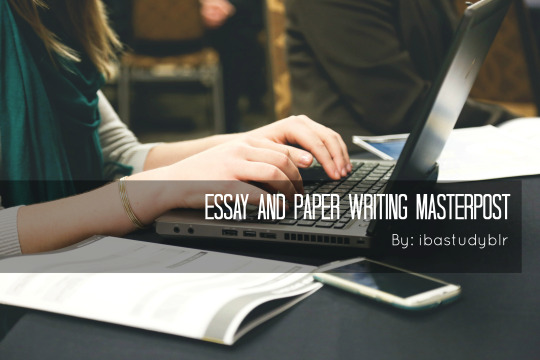
Working on an essay or a paper? Looking for feedback, help or editing support but have no idea where to turn for unbiased, constructive criticism and professional advice? Here are some great resources to help get you going!
General
Harvard’s Strategies for Essay Writing
Queen’s University Online Thesis Manager
How To Write A Great Essay About Anything
How to Write Dazzlingly Brilliant Essays: Sharp Advice for Ambitious Students
University of Cambridge - How to Write a Paper
Purdue OWL: Writing a Research Paper
Microsoft Research - How to write a great research paper
Georgetown University - How to Write a Research Paper
University of South California - Organizing Your Social Sciences Research Paper: Guide
Abstract Writing
Berkeley - HOW TO WRITE AN ABSTRACT: Tips and Samples
Purdue OWL - Writing Report Abstracts
University of Toronto - The Abstract
How to write a good abstract for a scientific paper or conference presentation
Introductions and Conclusions
Columbia University - Writing a Good Introduction
University of North Carolina at Chapel Hill - Introductions
Birmingham City University - Writing Introductions
University of Toronto - Introductions and Conclusions
Purdue OWL - Writing a Developed and Detailed Conclusion
Harvard - Ending the Essay: Conclusions
Editing
Paper Rater
Ginger’s Essay Checker
Hemingway Editor
ProWritingAid
editMinion
After the Deadline
Slick Write
Grammarly
GrammarBase
Citation
Citation Machine
BibMe
EasyBib
RefMe: APA
RefMe: MLA
Cite This For Me
University of South California - Citation Guide
11K notes
·
View notes
Text
Foolproof Guide to School Success!

Hi! I just finished my first year of college and I definitely have to credit the studyblr community for all the useful information and tips! I currently closed the year with a 4.0 and don’t plan on stopping!
In high school I was an ok student but I decided to change all that when I started college. So, whether you’re in high school or college, it’s never late to change and attain academic excellence! So here are my tips!
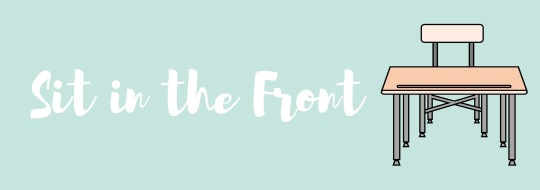
Try to get an early start on your day and sit closest to the front as possible. Studies show that sitting in the front of class will improve your grades and knowledge!
A study showed that those who sat in the front achieved an average of 80% while those in the middle achieved an average of 71.6% on their exams. And guess who did even worse.. unfortunately those in the back scored an average of 68.1%
Distractions are decreased because there’s no one sitting in front of you, just the lecture which basically forces you to pay attention.
This increases the likelihood of your professor getting to know you. Why is that important? Well, in an accounting course I once took, I sat in the front, attended extra tutoring sessions hosted by that instructor, and generally put in extra effort in the class. By the end of the semester everyone was really struggling, over 20 students flunked out, and even my tips weren’t getting me to that A I wanted. Well, because I had established who I was and that I was serious about the class, my instructor bumped my final course grade from an 88% to 93%! She said she noticed the effort I put in so she gave me the grade she thought I deserved
Seriously, sit in the front!!

Ok, now that you have a good spot in the class, make sure you take great notes! The Cornell notes system is great but do whatever works best for you.
Abbreviate often
Date your notes at the top so you can order them chronologically. This will make studying a breeze later on.
Find a color coding system that works for you. Highlight main ideas and vocab.
Find a notebook that works for you. I was lucky enough to score 20 moleskines at my local thrift store at 1 dollar a piece so I’ve been using those.
If you prefer loose leaf paper, buy a bunch and stick it into a flexible binder so you can organize and reorganize your paper.
Use post-its and sticky tabs to add extra info that you might have left out during class. Use sticky tabs to find certain notes faster.
These are some of my favorite note taking supplies:
These Pilot G-Tec pens are some of my favorite pens ever! They are super smooth and the lines are really fine. This 5 pack costs around $11 which is pretty affordable!
Mead notebooks are a classic staple. Seriously these are super durable!
These sticky post-it tab hybrids work really well for marking a page and highlighting important info.
Mildliners are really nice and the colors are not to bright. A pack runs around $7 and a 3 pack is $15 on Amazon.
If you want to go the extra mile, retyping up your notes is a great idea. That way your in class notes can be messy and it won’t matter since you’re going to type them up anyway. One Note is awesome for notes.

I developed my own system for deciding on how I will study and how often I will study. It goes something like this:
Rank your classes in order of difficulty into three sections:
Easy, medium, and hard….
Easy classes get one point
Medium classes get two points
Hard classes get three points
Is the class math related? ….. add 2 points
Is it science related? …… add 2 points
Is the class a subject that you struggle with? ….. add 3 points
is the class AP? ……… 3 points
Add up the points for each class.
Classes with 1-3 points:
these classes are generally easy and have an easy instructor, contain info you already know, etc.
These classes get 45 minutes a day in your schedule and minimal studying on weekends.
Classes with 4-8 points:
These classes might need some more effort so try to…
Set aside an hour a day and 30 minutes on weekends.
Classes with 9 points and up:
These classes are usually more intense, have daily assignments, have a strict instructor, etc.
Set 2 hours a day and an hour or more on weekends. Consider going to free tutoring provided by your school, join a study group, or go to your instructor’s office hours.

Plan your months, weeks, and days in advance! Keep a planner, calendar, or bullet journal. I personally use a bullet journal and keep a calendar printable in each binder I have for my classes.
Include due dates, exam dates, when your rentals are due, etc.
Look at it everyday!!! That way you won’t forget important events.
If you want to, make it pretty! Decorate it with stickers, pictures, polaroids, etc. to make it more personal.
If you prefer minimalism, keep a simple planner or bullet journal system.
If an electronic system works better for you, go for it! But I’ve noticed that writing it on paper works best!
Here are some great planners or journals to use:
Moleskines are always a great choice!
This hardcover Yoobi journal is comparable to the Moleskine and comes in pretty colors! The price is awesome, each one runs at $6!
Bando makes super pretty and trendy planners. They run from $20 and can get pricey though. It’s definitely worth it though!
This Sugar Paper gold polka dot planner is really cute and super affordable!
The AT-A-GLANCE planner has a monthly view and daily sections with plenty of room for writing in important dates and decorating with cute stuff!
Kikki K has amazing planners. If you want to splurge consider their stuff. I’ve always wanted one but it’s around the price of a textbook :(

While Studyblr has so many resources and tips, in case you haven’t noticed, a lot of the pretty pictures use muji pens, staedtler fineliners, and those cute lil’ backpacks. Remember that you have to use supplies that work with you. Here are the essentials to carry with you:
Notebooks and binders
A sturdy and comfy backpack. I use the Borealis backpack by The North Face on discount. Make sure it has comfortable straps, back support, enough room for all your stuff, and compartments for your food and water bottle.
A phone charger. Keep it in your backpack. My phone has died on me so many times and it sucks, especially if you have to take the bus. Invest in a portable charger.
Earbuds are a must, especially if you take public transportation. Also great for when you’re at the library, gym, etc.
As previously mentioned, a water bottle and FOOD! Pack a lunch but also have backup snacks like granola bars or nuts. You need food and water for energy.
Keep extra change. You never know when you need it!!
Your planner.
Pens, pencils, etc. Especially a stapler if you have homework that you regularly turn in!! Its really awk when someone doesn’t have a stapler and everyone in the class doesn’t either..
A laptop, seriously a must! Chromebooks are affordable!
Hope that’s helpful! Looking forward to another year in college and staying in the Studyblr community,
Thania
15K notes
·
View notes
Photo
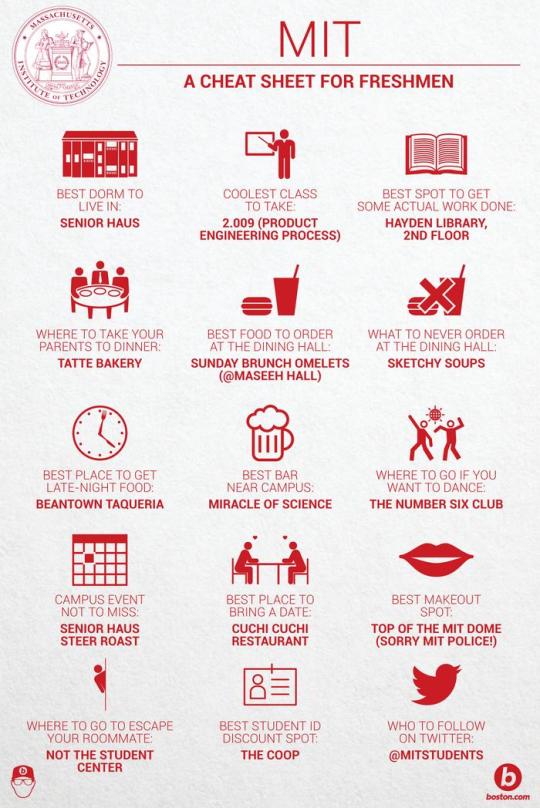
Boston.com asked current students and recent graduates to give us the inside scoop on their colleges before the school year begins. Here, current student Fabiana Zappala and recent graduate Zach Casas tell us the best and worst things about MIT, and also gives advice to incoming freshmen. Read the full article!
116 notes
·
View notes
Photo






The oldest college in America, Harvard University! It is such an amazing and beautiful campus.
0 notes
Text
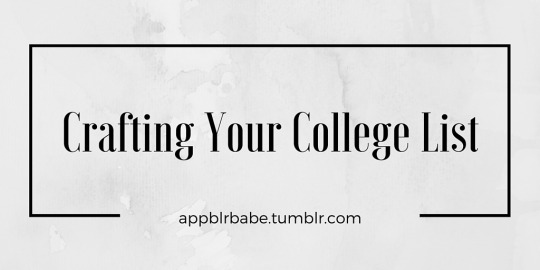
Crafting your college list can be hard. There is a lot of factors and a lot of schools (thousands in the US alone.) So how do you go about putting together a list of colleges that are good for you? That’s where this post comes in.
Keep reading
106 notes
·
View notes

